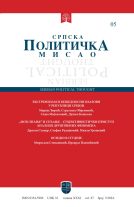- Home page
- Researchers
- MA Ljiljana Kolarski
MA Ljiljana Kolarski
Ljiljana Kolarski is a Research Аssistant at the Institute for Political Studies and the editorial secretary of the scientific journal „Serbian Political Thought”. She completed her basic studies in political science at the Faculty of Legal and Political Studies in Novi Sad, and her multidisciplinary master studies in Terrorism, Organized Crime and Security at the University of Belgrade. Until now, she has participated in a large number of national, regional and international programs. She is the author of several scientific works in the field of political science. Her areas of interest are extremism, terrorism, regional cooperation, as well as the political representation and participation of women in politics, which she will deal with in her dissertation. Through her doctoral dissertation, she aims to illuminate the challenges women face in parliamentary settings, ultimately contributing to the wider discourse on gender equality and political representation. She speaks English and Spanish fluently, and has limited knowledge of Russian. She is a member of the CEEHer GLOBSEC network, which gathers young female researchers from Southeast Europe.

WHEN THE HOME BECOME A BATTLEFIELD - FEMICIDE AND THE NATIONAL SECURITY OF THE REPUBLIC OF SERBIA
Femicide, as the most extreme form of gender-based violence, has been highlighted as a special social and security problem in the Republic of Serbia in recent years. Statistical data support the fact that over a ten-year period, more than three hundred women were killed by members of households of the opposite sex, of which over a hundred were killed by the use of firearms. Although the National Security Strategy of the Republic of Serbia does not specifically recognize the phenomenon of femicide as a challenge, risk, or threat to national security, an interpretive approach can relativize this claim for at least two reasons. The first stems from the importance that the Strategy places on human security, i.e. preservation and health security of groups and individuals, where and how femicide can be included. The second stems from the importance of social policy for national security, where special attention is paid to increasing the birth rate, demographic structure, and protection of the family, which, in the context of femicide, becomes a battlefield, not a refuge. Through a semiotic analysis of the content of strategic documents, with the use of quantitative data on femicide in Serbia, the paper aims to overcome the perception of femicide as a security problem, that is, to present men's directed desire to injure, destroy or punish women as a threat to national security. A special part of the paper will be devoted to the positive correlation between the availability of firearms and the rate of femicide in the Republic of Serbia, as well as a comparative analysis of statistics and experiences of other countries that record an infamous trend of increasing the number of femicides.

BALKAN INSIGHTS: A GRASSROOTS APPROACH TO PEACE AND SECURITY
Nemanja Džuverović and Věra Stojarová. 2023. Peace and Security in the Western Balkans: A Local Perspective. London: Routledge, p. 309.

INTEGRATION VS. SOVEREIGNATION. “OPEN BALKANˮ IN THE FRAMEWORK OF STATUS AND IDENTITY DISPUTES
The paper analyses the “Open Balkanˮ initiative with the intention of establishing, through a critical discourse analysis, the dominant positions of the countries of the Western Balkans regarding this form of regional cooperation. The authors will show that political discourses towards regional integration are, on the one hand, a product of the internal unfinished process of state and nation-building, while on the other hand, they are a direct consequence of open bilateral issues and the absence of a clear perspective of membership in the European Union. The paper proves that the dominant negative discourse on the “Open Balkansˮ initiative equates regional integration with the fear of losing sovereignty both over internal political processes and on the path of European integration.

A GENEALOGY OF TERRORISM-COLONIAL LAW AND THE ORIGINS OF AN IDEA
Book review: Joseph McQuade. 2021. A Genealogy of Terrorism: Colonial law and the Origins of an Idea. Canbridge: Cambridge University Press, p. 276.

